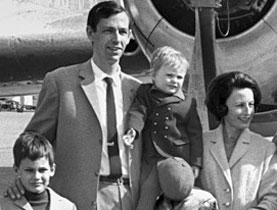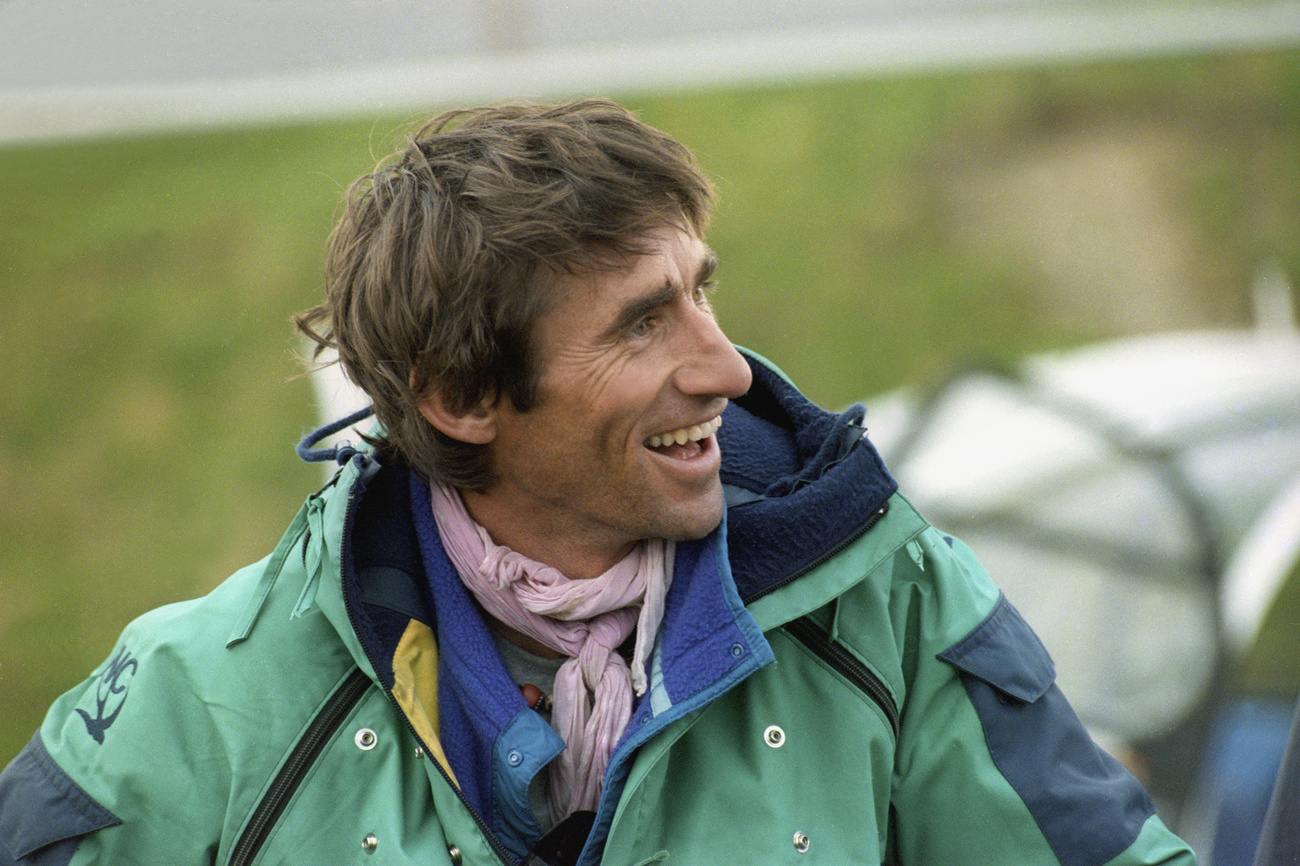The famous Swiss who died on their birthday

It’s a select club and not necessarily one you want to join: dying on your birthday. That said, you’d be in good company, with Swiss members including a pioneering scientist/balloonist, a record-setting mountain climber and an anarchist who became one of the best chefs in the world.
“Birthdays … appear to end up in a lethal way more frequently than expected,” was the sobering conclusion of a Swiss study published in the journal Annals of Epidemiology.
The 2012 study analysed almost 2.5 million deaths in Switzerland and found that the number of birthday deaths between 1969-2008 was almost 14% above the statistically expected number (18% for those over 60). The deaths were mainly due to heart attacks and strokes (more women than in men) as well as suicides and accidents (in particular, men falling).
Theories to explain this include “hanging in there” to reach another milestone, birthday-related stress (causing strokes and heart attacks) and alcohol-related accidents.
Some studies appear to back up these findings; for example, a 1997 Swiss study of more than 12 million people calculated an excess death figure of 17%. However, others have found no correlation or evidence of a birthday effect.
David Spiegelhalter, a statistician at the University of Cambridge, suggested that some of the death records used by the researchers in 2012 were simply inaccurate.
“The Swiss are, I’m sure, very precise bookkeepers. But it’s possible that someone could have a matching birth date and death date in their record when that wasn’t actually the case,” he said. Apart from people accidentally filling in the wrong box, if a dead person’s birth date isn’t known, an official – needing to write in something – might simply use the death date twice.
Whatever the explanation, and focusing on life rather than death, here is a celebration of some notable Swiss who joined and left the party on the same day.
Jean Piccard (January 28, 1884-1963)

Basel-born Jean Piccard was a chemist, professor, high-altitude balloonist and balloon engineer. He and his twin brother Auguste (the inspiration for Professor Calculus in Hergé’s Tintin comics) were part of a record-breaking dynasty of scientists and adventurers.
Piccard graduated from the Swiss Federal Institute of Technology in Zurich in 1907 with a degree in chemical engineering. He later taught at the universities of Munich, Lausanne and Chicago, where he met his wife, Jeanette. He became a US citizen in 1931 and lectured in aeronautical engineering at the University of Minnesota until his retirement.
On October 23, 1934, Piccard and his wife ascended in a hydrogen balloon to almost 18km, with Jeanette becoming the first woman to enter the stratosphere. (Three years earlier Auguste Piccard and his assistant Paul Kipfer had become the first humans to enter the stratosphere and witness the curvature of the earth.)

More
A family piles up the records
Jean Piccard later developed many innovations, including a frost-resistant window for balloon gondolas and an electronic system for emptying ballast bags.
Joseph Favre (February 17, 1849-1903)

Born the illegitimate child of a Catholic priest in canton Valais, Joseph Favre was raised by a local lawyer and became an apprentice cook aged 14. Keen to become a great chef, he worked not only all over Switzerland but also in the most prestigious hotels and restaurants in Paris, Berlin and London.
After briefly fighting in the Franco-Prussian War alongside Italian general Giuseppe Garibaldi, Favre returned to Switzerland in 1871 and, when not cooking in top hotels, attended university in Geneva and mixed in anarchist and socialist circles. In 1875 he co-founded the magazine L’Agitatore and met influential Russian anarchist Mikhail Bakunin, who had taken refuge in canton Ticino and to whom he dedicated his spongy Salvator Pudding.
Having toned down his politics, in 1877 he printed in Geneva the first culinary journal written by a chef in which he promoted the science of healthy cooking, “hygienic cuisine”. He also called for the creation of an international union of chefs organised in local sections and was the first to suggest the idea of culinary exhibitions and competitions.
Favre’s greatest legacy, however, is his four-volume encyclopaedia, The Universal Dictionary of Cuisine and Food Health. The second expanded edition, published the year he died, comprises some 2,000 pages of definitions and articles and more than 6,000 recipes.
Erhard Loretan (April 28, 1959-2011)

In 1995 Erhard Loretan became only the third person to climb all 14 of the world’s 8,000-metre peaks.
Loretan, from canton Fribourg, climbed the 1,829-metre Dent de Broc aged 11 and never looked back. He was the first to climb the highest peak in Antarctica, scaled Everest without supplementary oxygen in only 40 hours and in 1999 was voted sportsman of the century for French-speaking Switzerland.
However, in 2003 he pleaded guilty to negligent manslaughter for shaking his seven-month-old son to death. He was given a four-month suspended sentence and waived his right to anonymity in order to raise awareness of shaken baby syndrome.
Loretan died on the summit ridge of the Grünhorn in the Bernese Alps. He was climbing with his girlfriend, who slipped on some ice. Roped together, they both fell about 200 metres. She was seriously injured but survived; he died on the mountain.
George Reinhart (October 25, 1942-1997) – As a film producer, he was behind refugee drama The Boat is Full, which in 1981 was nominated for an Oscar for Best Foreign Language Film. He also built up an extensive collection of photographs and co-founded Scalo Verlag, an independent publishing house specialising in contemporary photography.
Werner Spross (June 3, 1925-2004) – Businessman, philanthropist. Aged 21 he took over the debt-ridden gardening firm founded by his grandfather and built it up into a successful consortium. This enabled him to help people in need and sponsor record-holding Zurich football club Grasshoppers.
Annemarie Düringer (November 26, 1925-2014) – Stage and screen actor. Films included Fassbinder’s Veronika Voss and the Oscar-nominated The Devil Strikes at Night.
Gottfried Eduard Hofer (October 20, 1891-1993) – Electrician/entrepreneur whose company Standard Telephon und Radio (STR) played a significant role in the construction of the Swiss telephone network. Hofer died on his 102nd birthday.
Markus Fierz (June 20, 1912-2006) – Physicist. Was awarded the Max Planck Medal and the Albert Einstein Medal. Briefly headed the theoretical physics department at CERN.
Georg Luck (February 17, 1926-2013) – Classicist. Specialist in magical beliefs and practices in the Classical world. Born and studied in Bern, ended up teaching at many Ivy League universities.
Ingrid Bergman, Swedish actor
Betty Friedan, US feminist writer and activist
Sidney Bechet, US jazz clarinettist
Milton Glaser, US graphic designer
Jane Ising, German-US scientist (lived to 110)
Astrid Zachrison, Swedish supercentenarian (lived to 113)
William Shakespeare – rumoured, but exact date of birth is unknown

In compliance with the JTI standards
More: SWI swissinfo.ch certified by the Journalism Trust Initiative













You can find an overview of ongoing debates with our journalists here . Please join us!
If you want to start a conversation about a topic raised in this article or want to report factual errors, email us at english@swissinfo.ch.